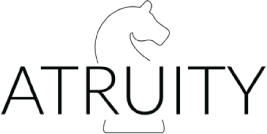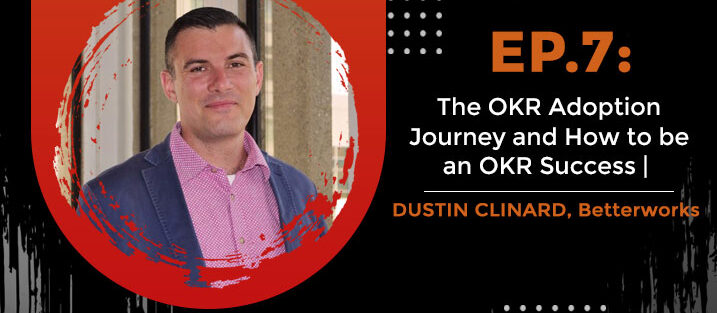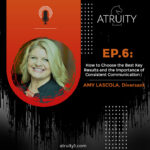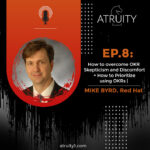In this episode of the OKRS Q&A Podcast, Tim Meinhardt interviews Dustin Clinard, Vice President of Strategic Partnerships for Betterworks. This is definitely a must listen episode! Dustin provides fantastic insight into OKRs and the OKR Adoption journey. His unique perspective is incredibly useful, not only for large enterprise organizations, but for the SMB Marketplace as well.
Betterworks is the only OKR and CFR platform endorsed by John Doerr. With its unique combined OKR, Conversations, Feedback, and Recognition (CFRs), and Engagement solution, Betterworks empowers companies to execute on their business objectives with agility and resilience through alignment, commitment, and transparency. Betterworks’ Formula For Better™ empowers leaders and employees to perform at the highest level and sustain competitive advantage, from anywhere.
Betterworks’ solution and Professional Services Team has helped a variety of global organizations including; Intuit, Kroger, Lending Tree, and Vertiv, achieve agile execution. Betterworks is used daily by employees and managers from 119 countries in 20 languages. For more information about the latest business and people management strategies and best practices, please visit http://www.betterworks.com.
If you are interested in working with the Atruity team or have a question you would like addressed on the show, please email contact@atruity1.com or visit our website at www.atruity1.com
Tim Meinhardt:
Welcome to another exciting episode of the OKR Q&A podcast, also known as the OKR Corral, where OKR insight is king. I’m your host, Tim Meinhardt, CEO of Atruity, an OKR consultancy headquartered in our nation’s capital.
On today’s show, we’re delighted to spend time speaking with Dustin Clinard. Dustin provides some fantastic insight into OKRs and the OKR adoption journey. Dustin has an MBA from Northwestern University’s Kellogg School of Management, and he’s currently the vice president of strategic partnerships at Betterworks.
Betterworks is a world class OKR software platform supporting global workforces in over 119 countries and in more than 20 languages. Please welcome Dustin Clinard. Dustin, welcome to the program. Tell our audience a little bit about yourself and your background.
Dustin Clinard:
Sure. Thanks Tim. I’m pleased to be here and I love the effort that you have.
Tim Meinhardt:
Well, thank you.
Dustin Clinard:
So, I’ll introduce myself. I’m Dustin Clinard. I run partnerships for Betterworks, which as you may or may not know, and many of your listeners might know, is the OKR software that is endorsed by John Doerr. It’s the only software that’s endorsed by John Doerr. And we’re lucky that we have John’s relatively recent release of Measure What Matters as a book that helps as we think about enacting change within businesses.
I live in Boston. I have three daughters and a son and the coronavirus pandemic has created, for many people including myself, some interesting dynamics. Most of which I’m very thankful for because I’m not home for dinner and for the last 15 years I’ve been on the road. So it’s been great.
Tim Meinhardt:
Fantastic. I just want to share with the audience, I had the pleasure of listening to John Doerr in one of your, I guess, webinars or podcasts. And I actually received a signed copy of his book. And it sits in my trophy case downstairs, and it’s a very wonderful piece to have. And I think he and Andy Grove were very insightful in presenting this methodology to the public.
Dustin Clinard:
Yes.
Tim Meinhardt:
So Dustin, talk to us a little bit about the OKR marketplace, not only in the United States, but globally. What are Betterworks’ thoughts about the OKR marketplace?
Dustin Clinard:
Yeah. Yeah. I mean the great thing and the book was part of it, I think OKRs, as you mentioned, are not necessarily new. Intel often gets a lot of the credit for starting the concept with Andy Grove. Google gets a lot of the credit for creating the big tech relatively recent success story.
I think the overall market continues to grow. If we simply look at search, demand or interest in exploring software or consulting services, OKR has continued to grow in all parts of the world. I think the US, North America and Europe have a predominant role to play. Most of the interest comes from those countries. We see a lot of interest from India. There’s a lot of engineering firms that have built OKR or are building OKRs into what they do.
And then an increase in other markets, Korea, other parts of Southeast Asia, Latin America, where I think the trends, at different rates, will continue to grow. And the pandemic has really only spiked that.
Tim Meinhardt:
Sure.
Dustin Clinard:
I’m sure you’ve seen some of this too, but the increase in people working from home, the ability to use OKRs as a tool to focus, has really ramped up the interest in, for those who don’t know what it is, what do I need to know? For those who used it in pockets, how do I use this more broadly?
Tim Meinhardt:
Yes, absolutely. In fact, companies that we work with to a person have said, “Thank God we have this in play because it allowed us to stay more connected, focused, aligned and allowed us to execute actually through times that we’ve all never seen before.” Dustin, in your opinion, when folks come in and begin to work with you, what are the largest challenges do you think they face as they begin to look at an OKR program throughout the organization?
Dustin Clinard:
Yeah, I think there are a lot of commonalities that we start to see across programs that we’ve implemented, where both they’ve been successful. And I can talk about those, but where they haven’t been so successful either with us or with others in the past.
Often I think there’s one big thing and it’s a lack of executive sponsorship. The lack of executive sponsorship creates what we like to think of as like going to the gym. Right. It’s really easy to get excited and to start something. It’s great if you could wake up and say, “I’m going to go to the gym today.” That’s a great start. Week two, week four, week eight, if your plan is to go four or five times a week, it often starts to fall down. And so, in the workflow, repetitive nature, visibility, that’s often driven at some executive level.
And so, what we see is when there’s executive sponsorship and there’s adoption from an executive team, the reinforcement mechanisms are there. And without the app, you rely on teams to be able to bubble up. And it’s a difficult thing to do for any complex enterprise. I think the second thing is when organizations start to see that, okay, ours are not simply a tool, but a mindset.
Tim Meinhardt:
Right.
Dustin Clinard:
It’s the way we think about bringing strategy to every conversation. It almost creates a sense of transparency that at some point in time companies say, “Am I really ready for this? You can see my goals and my progress against my goals. Is that what I want? I wanted to see yours. I didn’t know if I wanted you to see mine.”
Tim Meinhardt:
See mine, right.
Dustin Clinard:
Yeah. But when you then start to realize that goals to a lot of people mean a reflection of you personally, a reflection of you as an individual. OKRs are a reflection of your ability to move business objectives forward. And when that mindset shifts, then you realize that is what we want. We do want full transparency. I want to know how marketing is doing relative to dependencies in engineering and figure out where the broken link starts so that we can advance them. So, [crosstalk 00:07:22] those are probably the two biggest issues.
Tim Meinhardt:
If there was one or two things, and you’ve been involved in so many conversations with large organizations, where does their hesitancy lie sometimes when they look at objectives and key results? What gives them pause? And then maybe the reverse of that is, what gives them the ability to make that decision to move forward?
Dustin Clinard:
Yeah, well, I think the Betterworks model is a service supported software model. Meaning we have enough experience with customers and enough experience on our team and with our investors to recognize that software itself isn’t going to solve all of the problems.
Tim Meinhardt:
Right.
Dustin Clinard:
And as a software company, it can be humbling to say sometimes, but simply turning on Betterworks software is likely not going to solve the challenges. Supporting those challenges with the level of change that may be necessary, executive adoption, as we talked about, program leadership. As companies start to recognize that this may be a reasonable effort to get right across a company, it can change the way they started it. Which was, “Hey, can I just buy this OKR tool?”
It opens up some interesting conversations, which often don’t get brought up at the beginning. What was I trying to achieve by bringing in this OKR tool? I want some focus and I want some accountability. Those are things that companies want. It would be hard to find somebody who didn’t want that.
The question is, when you get that, when there is more focus, when there is more accountability, when there is transparency, what happens? What happens from a business value standpoint? What happens from a customer value standpoint? Then you start to realize that it is pretty significant for most organizations, which clicks with the significance of how seriously they take the effort. And that’s where the conversation moves into high gear.
Tim Meinhardt:
Yeah, well said. So I’m going to shift conversation a bit here. What makes Betterworks one of today’s leading software providers for OKR programs?
Dustin Clinard:
Sure. It’s having John Doerr as our endorser is a significant differentiator for us. I think we’ve combined that with a board of directors and advisors that provide complimentary views as an organization like ours grows. Every customer we face, there are similarities, but they do all have their unique challenges.
For example, organizations across the board that try to add another piece of software that is difficult to find or difficult to get into, or requires a lot of training, those are hurdles that you have to overcome. So part of our board comes with this view of what’s the user experience? Is it intuitive? Is it easy to use? We don’t need people to have to figure out a lot of things. That’s one big angle when we think of, can somebody turn it on? Can a mid-level manager figure out, “Hey, what are the OKRs? How are they connected?” Things like that.
The second thing is the complexity at the enterprise level. I think there is a big difference between trying to solve a problem for 20% teams or a startup of 100 people compared to a department of 1,500 people or a company of 20,000 people or larger than that. The complexities become quite different and the approach would be different.
Tim Meinhardt:
Yeah. How about a little bit more about Betterworks in its integration with some of today’s leading software programs? Maybe you could touch on that. That’s where it goes over my head. So, I thought maybe you could touch a little bit about that. A lot of people are using JIRA, Slack, Salesforce. How does that work with Betterworks?
Dustin Clinard:
Yeah. Part of being intuitive is recognizing where work gets done. And Betterworks for example comes with out of the box integrations with Salesforce, with JIRA, with Asana, with Google G Suite. The idea is if you’re doing work, you’re either in email or you’re doing it in one of those other tools.
And so, rather than ask folks to duplicate work, grab that, leave that source of truth, where it is and input the data. So for example, as a key result is updated from sup an Epic in JIRA, that is connected. So, you’re doing the work in JIRA and it’s reflected in Betterworks.
The other way we do it is make it easy to see… If you think of OKRs at the highest level, they’re about priorities. And if you think many white collar workers sit in their email all day, well, let’s create a place where they can see their OKRs without having to leave their email. And they can do updates from there. They can comment, they can nudge, they can poke, things like that.
So, that’s an important workflow for connectors. In today’s day and age, the open API configuration means you can transfer a lot of data back and forth. And duplicating it is simply a lot to ask for people when it’s not necessary.
Tim Meinhardt:
Right. Absolutely. This has been great today. And thank you so much. So, any other advice you’d like to give our audience about OKRs, programs, that little secret tidbit that no one really knows that they’re dying to hear?
Dustin Clinard:
So, maybe it’s maybe two things.
Tim Meinhardt:
Sure.
Dustin Clinard:
One, gone are the days of management by walking around. And in the remote environment, you have to have a mechanism that allows you to keep people focused on what really matters. You can’t see people. It’s calling into question a lot of traditional leadership approaches. Now that I can’t see people, I can’t see what they’re doing, so the nature of my conversations needs to change.
So, part of Betterworks’ model is this conversation feedback recognition model. That becomes really important when we’re on Zoom all day or web conference all day. I need to know what those conversations are going to be about. And so the OKR CFR model ties a lot of that together.
I think that the other thing is, it’s okay to start wherever you feel comfortable starting. Excel, Google sheets, if you have a small team, you can do OKRs in a tool like that. As you grow in scale, one of the things that you want to be able to do is pivot quickly. And if you have a software system that allows you to see right now, where’s our progress? And if we shift priorities right now, how does it impact everybody else? That’s where a tool like Betterworks will really help.
And so, happy to talk about anybody who wants to talk about BetterWorks. The thing that we would all benefit from is get comfortable, use OKRs no matter where you start. It’s getting to the gym is the starting.
Tim Meinhardt:
You got to start somewhere. And I think, what we’ve seen with our clients is everybody gets better every week they go through it, and every quarter they go through it, and every year they go through it. Well, Dustin, I wanted to thank you so much. I know our audience will love this conversation. And I so much appreciate you spending time today with us. And I hope you have a terrific Q3. And we will talk again shortly.
Dustin Clinard:
I love it, Tim. Thank you.
Tim Meinhardt:
You’re welcome. Bye-bye now.
Atruity is a trusted OKR consultancy firm that provides guidance, insight, frameworks, and advice on OKR that are essential to establish the goal setting plan that best suits your organization. Let us know how we can help. Call us at 240.403.4086.
To listen to the podcast, click on the links below:












